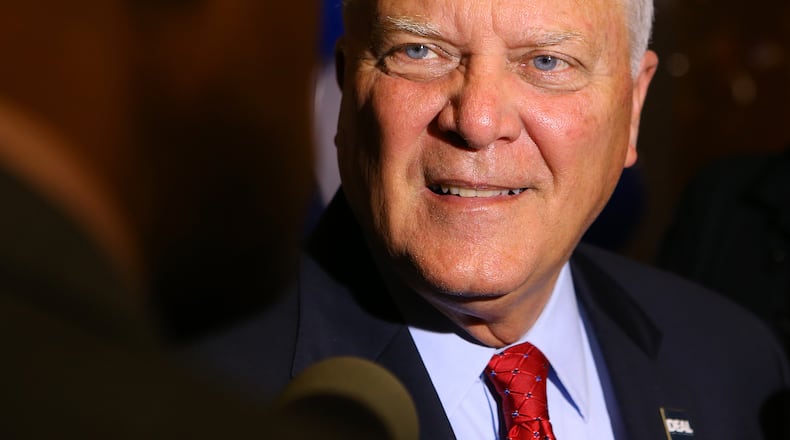What was long expected to be tight elections at the top of the ticket turned into resounding victories Tuesday night for Gov. Nathan Deal and Republican Senate hopeful David Perdue.
Here's a look at six key factors that helped them win decisively:
The base came home. Deal's staff said they detected a noticeable shift in their internal polling last Monday, after the final debate against Democrat Jason Carter and Libertarian Andrew Hunt. Perdue's people said they caught momentum in the last 10 days, as well. Bottom line: The GOP base was motivated, as the national wave broke toward Republicans. The top-ticket Republicans racked up more than 75 percent of the vote across most of north Georgia, which helped them overwhelm Democratic turnout in DeKalb and Fulton counties.
Deal made use of his executive office. The governor's staff used the power of incumbency to maximum effect the final stretch of the campaign. He announced new jobs deals, unveiled Ebola virus restrictions and boasted of an election-eve magazine ranking. Democrats criticized the timing, but Deal's staff indicated that, at the very least, they knew the developments couldn't hurt them.
Perdue nationalized the race. We had our fun with "Obama and Reid, and Reid and Obama" but it worked, as Perdue successfully linked Democrat Michelle Nunn with the Democratic regime that took a shellacking across the country Tuesday night. Nunn did her best to separate herself from Obama, but when the president tried to rally the Democratic base with an interview with V-103 touting Nunn, it solidified the message.
Deal focused on the economy. While Carter stuck to an education-first message much of the campaign, Deal built his re-election efforts largely around the economy. The reason why: The governor's internal polling showed that 54 percent of voters listed economy as their top priority. Education was a distant second at 25 percent. Carter pivoted to the economy in September, as news emerged that Georgia led the nation in unemployment, but Deal's staffers were surprised he didn't do so sooner.
Republicans kept their advantage with white voters. Deal was tracking to keep pace with his victory four years ago over former Gov. Roy Barnes, which he won with about 53 percent of the vote. And Perdue, to the surprise of most analysts, earned at least 10,000 more votes than the incumbent governor. They did this by solidifying their grip on white voters. An AP exit poll showed Perdue won at least 70 percent of the white vote, and Republican strategists believe it was closer to 75 percent. Deal said even he was taken aback by the "surprisingly big margin" over Carter, despite polls showing a much tighter race.
The Republicans had a strong ground game, too. The GOP stepped up its investments in targeting and turnout, with 17 offices around the state. In the last week alone, Republicans contacted 400,000 Georgia voters through phone calls or door knocks, according to Perdue's chief consultant, Paul Bennecke. Much was made of the Democratic machine and shifting demographics, but Republicans got their people out.
About the Author
The Latest
Featured




